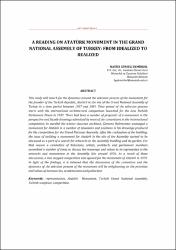A Readıng on Atatürk Monument in the Grand Natıonal Assembly of Turkey: From Idealızed To Realızed
Abstract
Bu çalışma Türkiye Cumhuriyetinin kurucusu Atatürk için Türkiye Büyük Millet Meclisi bahçesinde yapılacak olan anıt yapısını belirleme sürecinin (1937-1981) dinamiklerini açığa çıkarmayı hedefler. Yapılacak olası bir anıtın belirlenmesi süreci 1937'de yeni meclis binası için açılan yarışmayla başlar. Aslında yarışmacıların teslim paftalarında yer alan perspektif ve cephe çizimlerinde Atatürk anıtının ya da olması muhtemel bir anıt için çeşitli öneriler yer almaktadır. Bunlara parallel olarak kazanan Avusturyalı mimar Clemens Holzmeister da yarışmaya teslim ettiği ve yıllar içinde ürettiği meclis binası eskiz ve çizimlerinde birden fazla yer ve şekilde anıt tasvirlerinde bulunmuştur. Binanın gerçekleştirilmesinden sonra meclis içinde ve bahçesinde gerçekleştirilmesi düşünülen sanat yapıtları üzerine tartışmalar üretilmiştir. Tam da bu sebeble tarihçiler, sanatçılar, mimarlar ve meclis ve senato üyelerinden oluşan bir komisyon sanat yapıtlarında ve meclis kampüsünde yapılacak anıtlarda temsil edilmesi gereken değerleri ve anlamları belirlemek üzerine birden fazla toplanmıştır. Bu tartışmaların ışığında 1979 yılında Atatürk anıtı için iki aşamalı bir yarışmaya çıkılması kararlaştırılmıştır. This study will search for the dynamics around the selection process of the monument for the founder of the Turkish Republic, AtatÜrk in the site of the Grand National Assembly of Turkey in a time period between 1937 and 1981. Time period of the selection process starts with the international architectural competition launched for the new Turkish Parliament House in 1937. There had been a number of proposals of a monument in the perspective and façade drawings submitted by most of the competitors in the international competition. In parallel the winner Austrian architect, Clemens Holzmeister envisaged a monument for AtatÜrk in a number of situations and positions in his drawings produced for the competition for the Grand National Assembly. After the realization of the building, the issue of building a monument for AtatÜrk in the site of the Assembly started to be discussed as a part of a search for artworks in the Assembly building and its garden. For that reason a committee of historians, artists, architects and parliament members assembled a number of times to discuss the meanings and values to be represented in the artworks and monuments in the Assembly Site around 1976. As a result of these discussions, a two stepped competition was opened for the monument of AtatÜrk in 1979. In light of the findings, it is believed that the discussions of the committee and the dynamics of the selection process of the monument will be enlightening on the priorities and values of bureaucrats, academicians and politicians.
Source
Art-Sanat DergisiVolume
1Issue
1URI
http://www.trdizin.gov.tr/publication/paper/detail/TWpBeE5qVTFOUT09https://hdl.handle.net/11421/19764


















